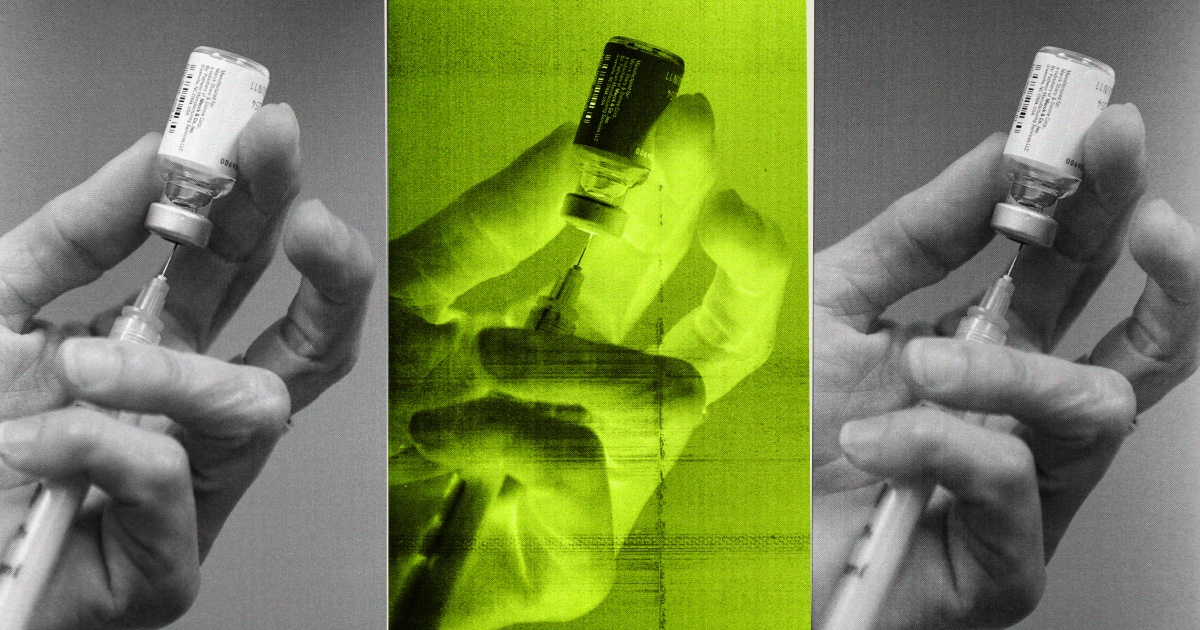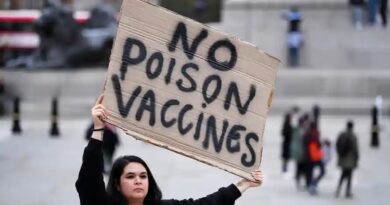How the anti-vaccine movement is downplaying the danger of measles

As outbreaks of measles spread throughout the world, anti-vaccine activists aren’t just urging people not to get vaccinated — they’re taking a page from a well-worn playbook, falsely downplaying the dangers from the highly contagious respiratory disease.
“The truth is, measles is not a super severe serious illness when you’re a child,” Mary Holland, president of the country’s best-funded anti-vaccine organization, Children’s Health Defense, said last week on the group’s online morning show. Children’s Health Defense was founded by Robert F. Kennedy Jr., who took a leave from the organization in April to run for president.
Holland, a lawyer, called government responses to recent outbreaks “fearmongering” and “crying wolf.”
“It’s a couple days of spots and then you move on,” she said.
But national health agencies warn the fear of measles is well-founded.
Measles — a disease so contagious it acts as a bellwether for threats from other infectious diseases — is marked by fever, flu-like symptoms and an itchy rash, and sometimes comes with dire complications including pneumonia, seizures and brain damage. For every 1,000 cases of measles, about 200 children may be hospitalized, 50 may get pneumonia, one child may develop brain swelling along with deafness or disability, and between one and three may die.
Despite the availability of an incredibly effective vaccine, the disease is spreading worldwide. The reasons behind the surge are complex. For countries in Africa, the Middle East and Southeast Asia, there are issues of access; childhood vaccine campaigns suffered when Covid weakened already-stretched public health systems. Europe, the U.K. and the U.S. experienced similar, if smaller-scale, disruptions to their childhood vaccine programs during Covid. Rising vaccine skepticism plays a smaller but significant part.
Last month, the World Health Organization announced an “alarming” 45-fold increase in measles in Europe from 2022 to 2023, while health officials in the U.K. declared a “national incident” stemming from an outbreak of hundreds of cases in the West Midlands, warning of a likely spread to other regions. U.K. officials attribute the rise to a drop in vaccine uptake.
Across the U.S., state and regional health agencies have been announcing cases of measles in their communities. The Centers for Disease Control and Prevention issued an advisory last week for providers to “stay alert” for measles cases, citing 23 confirmed cases since Dec. 1, mostly among unvaccinated children.
Anti-vaccine activists and influencers are unfazed.
Mother and wellness influencers with tens of thousands of followers on Instagram have reacted to the recent outbreaks with posts warning their audience not to buy into the hype. “As the news tries to fear-monger about the measles ‘outbreak,’” one home birth advocate posted, “remember that the vaccine is more dangerous than the actual illness.” (This is false.)
Other mom influencers posted memes tapping into nostalgia for a time when some parents intentionally exposed their young children to measles, mumps and rubella with “parties,” as the diseases were considered serious, but less harmful for young children. These planned contaminations largely ended with the availability of vaccines, which offered the preferable opportunity to avoid the diseases in childhood and beyond.
Before a measles vaccine became available in 1963, the U.S. saw an estimated millions of cases per year, tens of thousands of related hospitalizations, and hundreds of deaths, according to the CDC. At the time, compared to polio and smallpox, measles was considered a milder disease, but riding a wave of success from those immunization efforts, the federal government launched a vaccine push to eradicate measles and by 1969, cases had fallen dramatically.
While pockets of distrust for vaccines have existed as long as vaccines themselves, certain events — most notably the publication of since-discredited research by disgraced doctor Andrew Wakefield — supercharged the anti-vaccine movement and have powered the enduring and false belief that vaccines lead to autism and other maladies.
The tactic of minimizing the threat of vaccine-preventable illnesses is nothing new. Anti-vaccine activists in the 1800s dismissed the dangers of smallpox as “senseless panic” ginned up by doctors and health officials. And during Covid — a disease that claimed over 1 million American lives — activists claimed through debunked documentaries and conspiracy-theory-laden books that the vaccines were more dangerous than the disease.
In 2019, as measles surged through the U.S. at a rate not seen in decades, then-President Donald Trump reversed his previously hesitant stance to urge parents to get their children vaccinated. In response, weeks later, the second best-funded anti-vaccine organization, the Informed Consent Action Network, released “Measles for Dumbies,” a video guide for how to “identify, understand and refute mainstream misinformation,” about what Del Bigtree, the group’s executive director and now director of communications for the Kennedy campaign, called “a benign childhood disease.”
By December 2019, a measles outbreak in Samoa — where anti-vaccine activists including Kennedy had advocated against measles-mumps-rubella vaccines — had killed dozens of children and babies, underscoring the consequences of low vaccination rates. Kennedy told NBC News last year that he discounts the official cause of those deaths, believing despite evidence to the contrary that the vaccine, not measles, was to blame.
Kennedy has made light of measles for years. In 2021, at an Amish country fair in Lancaster, Pennsylvania, he praised low vaccine rates and warned the audience that the government was “coming for the Amish.”
“I am a measles survivor,” Kennedy said sarcastically as the crowd roared with laughter. “It was extraordinary. I’m very, very lucky to have lived through that nightmare because we had to stay at home and watch TV the whole week with all of my brothers and sisters. It was horrible.”
“What is the cure for measles?” he continued. “Chicken soup and Vitamin A. Neither of those things can be patented.”
Kennedy went on to suggest that pharmaceutical companies were ignoring harms from the measles-mumps-rubella vaccine — a claim without evidence — to make “permanent customers” of injured children.
Asked for a comment, Stefanie Spear, the Kennedy campaign’s press secretary, said in an email: “The reason Mr. Kennedy was making light of measles infection is because his generation considered it a routine childhood illness.”
Spear added that measles deaths were relatively rare before the vaccine was invented. “Virtually every one of our grandparents who were alive before 1960 caught the measles and survived it,” she said. “We would not be having this conversation if our grandparents had died from measles.”
Nostalgic stories like Kennedy’s remain one of the anti-vaccine movement’s go-to modern talking points, illustrated most often by a piece of pop culture posing as evidence — a 50-year-old episode of “The Brady Bunch.” The clip, in which the Brady children contract and recover from measles with little fanfare or seeming concern from their sitcom parents, went so viral in 2019 that a former star from the show spoke out against it. The clip is going around again in anti-vaccine circles.
It’s a campaign fueled by selective memory, and one with senseless consequences, said Dr. Paul Offit, the director of the Vaccine Education Center at Children’s Hospital of Philadelphia and a frequent target of the anti-vaccine movement.
“Most everybody who was born before a vaccine was available had measles. I had measles as did all my friends. I lived, but not everybody did,” Offit said. “It is galling that people think if they don’t see somebody die right next to them then it never happened.”
Offit mentioned the 1991 measles outbreak in Philadelphia that started in a church community. By the time health officials had it contained, 1,400 people, mostly unvaccinated preschoolers, had been infected. Nine children died.
Measles means “suffering, hospitalizations, ICU admissions and the occasional death,” Offit said. “Kids with measles are sick. It’s a miserable illness.”
Less talked about, Offit said, is an extremely rare condition, subacute sclerosing panencephalitis, or SSPE, a fatal disorder of the brain that can manifest about seven years after a measles infection.
“This is a preventable illness,” Offit said. “We could eliminate this virus from the world if we wanted to.”
Elimination would rely on vaccines, which are widely available, safe, effective, and under constant threat by a growing anti-vaccine movement.


